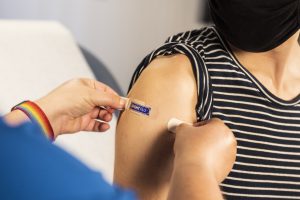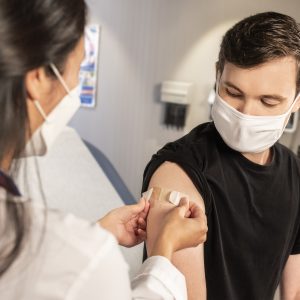Last Updated on October 18, 2024
As a pediatrician I am very familiar with respiratory syncytial virus (RSV). In infants and young children RSV infection results in a sometimes frightening seasonal illness called bronchiolitis. The virus affects the smallest airways, called the bronchioles, and results in wheezing and trouble breathing. There is no effective antiviral medication, only supportive treatment. The illness is especially severe in premature infants.
- In June 1998 one of the first monoclonal antibody drugs palivizumab was approved as a preventative measure given to premature infants at high risk for severe infection.
- In July 2023 another monoclonal antibody drug named nirsevimab-alip was approved for a broader range of children, including all infants younger than 8 months born during or entering their first RSV season (October-April) and infants and children aged 8-19 months who are at increased risk of severe RSV disease and entering their second RSV season.
- As of September 2023, there is no RSV vaccine currently approved for children.
However, as an older adult, I had not considered RSV as an adult problem, until I had it last winter. Although RSV usually presents as a simple upper respiratory infection (common cold) or influenza-like illness, it can be a significant problem for those who are immunocompromised, at-risk infants and children, and adults ages 65 and older who can develop a severe and occasionally deadly illness. In addition, any individual with an RSV infection can spread the illness, which is especially dangerous to those at high-risk for severe disease.
This is also the same population as those at high risk from COVID-19 and influenza infections. When taken together, this “tripedemic” poses a serious risk to this population.
Influenza has a similar seasonal variation to RSV, while COVID-19 is more spread out due to rapidly evolving variants. The risk of developing any of these infections can be decreased with the same protective measures, such as masking and social distancing. This was demonstrated by the steep drop in cases of RSV and flu in the United States and around the world during the height of the COVID-19 pandemic in 2020 and 2021 and the increase in cases when the measures were relaxed.
According to the Centers for Disease Control and Prevention (CDC), about 60,000-160,000 older adults in the United States are hospitalized per year due to complications from RSV, while 6,000 to 10,000 dies from the virus.
For most healthy children and adults, RSV causes symptoms resembling those of a cold or the flu: runny nose, nasal congestion, sore throat, and cough. However, RSV can spread to the lower respiratory tract, causing bronchiolitis or pneumonia, resulting in more significant respiratory symptoms such as a barking or wheezing cough and trouble breathing.
Similar to RSV in children, for most adults, there are no specific antiviral treatments and care is supportive. However, the FDA had approved the antiviral drug ribavirin to treat severe lung infections caused by RSV. Unfortunately, ribavirin is known to have several adverse side effects, including rash and chest pain. Those severely immunocompromised may be given ribavirin, possibly in combination with intravenous immunoglobulin (antibodies from healthy people), to fight off the infection.
Prevention is the best option and, like COVID-19 and influenza, RSV now has effective vaccines.
On May 3, 2023, the U.S. Food and Drug Administration approved Arexvy, the first RSV vaccine, for use in the United States. It is manufactured by GlaxoSmithKline and is approved for the prevention of lower respiratory tract disease (bronchiolitis and pneumonia) caused by RSV in adults 60 years of age and older.
- The approval was based on a randomized placebo-controlled trial that recruited about 25,000 participants 60 years of age and older, half of whom received Arexvy and half of whom received a placebo.
- Compared to participants who received a placebo, those receiving Arexvy had an 82.6% reduction of the risk of developing RSV-associated bronchiolitis and pneumonia and a 94.1% reduction of the risk of developing severe RSV-associated disease.
On May 31, 2023, the U.S. Food and Drug Administration approved a second RSV vaccine for use in the United States, ABRYSVO. It is manufactured by Pfizer and was initially approved for the prevention of lower respiratory tract disease (bronchiolitis and pneumonia) caused by RSV in adults 60 years of age and older. On August 21, 2023, the U.S. Food and Drug Administration also approved ABRYSVO for use in women who are in their 32nd-36th week of pregnancy to prevent RSV disease in their infants from birth through 6 months of age.
- The approval for those 60 years old and older was based on a randomized placebo-controlled trial that recruited about 37,000 participants 60 years of age and older, half of whom received ABRYSVO and half of whom received a placebo. Compared to participants who received a placebo, those receiving ABRYSVO had a 66.7% reduction of the risk of developing RSV-associated bronchiolitis and pneumonia and an 89.7% reduction of the risk of developing severe RSV-associated disease.
- The approval for women who are pregnant was based on a randomized placebo-controlled trial that recruited about 7,000 pregnant women, half of whom received ABRYSVO and half of whom received a placebo. Compared to participants who received a placebo, infants of those receiving ABRYSVO had an 81.8% reduction of the risk of developing severe RSV-associated disease by 90 days old and a 34.7% reduction through 180 days old. In a subgroup of 3,000 pregnant women who were in their 32nd-36th week of pregnancy, the vaccine was even more effective. The risk of their infants getting bronchiolitis and pneumonia by 90 days old was reduced by 34.7%, while the risk of severe disease was reduced by 91.1%, and through 180 days old, the risk of getting bronchiolitis and pneumonia was reduced by 57.3%, while the risk of severe disease was reduced by 76.5%.
- Pfizer is currently working on RSV vaccines that will be safe and effective for children.
In addition to older adults and women who are pregnant, The RSV vaccine should also be considered for those with:
- Chronic medical conditions such as lung diseases (e.g., chronic obstructive pulmonary disease, asthma), cardiovascular diseases (e.g., congestive heart failure, coronary artery disease), neurological or neuromuscular conditions, kidney, liver or hematologic disorders, diabetes mellitus, moderate or severe immune compromise (either attributable to a medical condition or receipt of immunosuppressive medications or treatment);
- Significant frailty, such as those with anorexia nervosa;
- Long-term residency in nursing homes or other long-term care facilities; and
- Other underlying medical conditions or factors that a health care provider determines might increase the risk of severe respiratory disease.
RSV can be a serious illness in older adults, infants, and those at higher risk for other reasons. This is in addition to the ongoing risks posed by COVID-19 and influenza. As we learned by dealing with influenza over the years and the COVID-19 pandemic, vaccination programs are the best way to prevent both significant/severe disease and widespread transmission of these diseases, especially to high-risk individuals.
Now that these new safe and effective RSV vaccines are here and becoming increasingly available, it is essential that those who are at the highest risk of getting or spreading the disease talk to their healthcare providers about getting an RSV vaccine. The RSV vaccine can be given with the influenza and COVID-19 vaccines. It’s time to try and stop the “tripledemic.”





